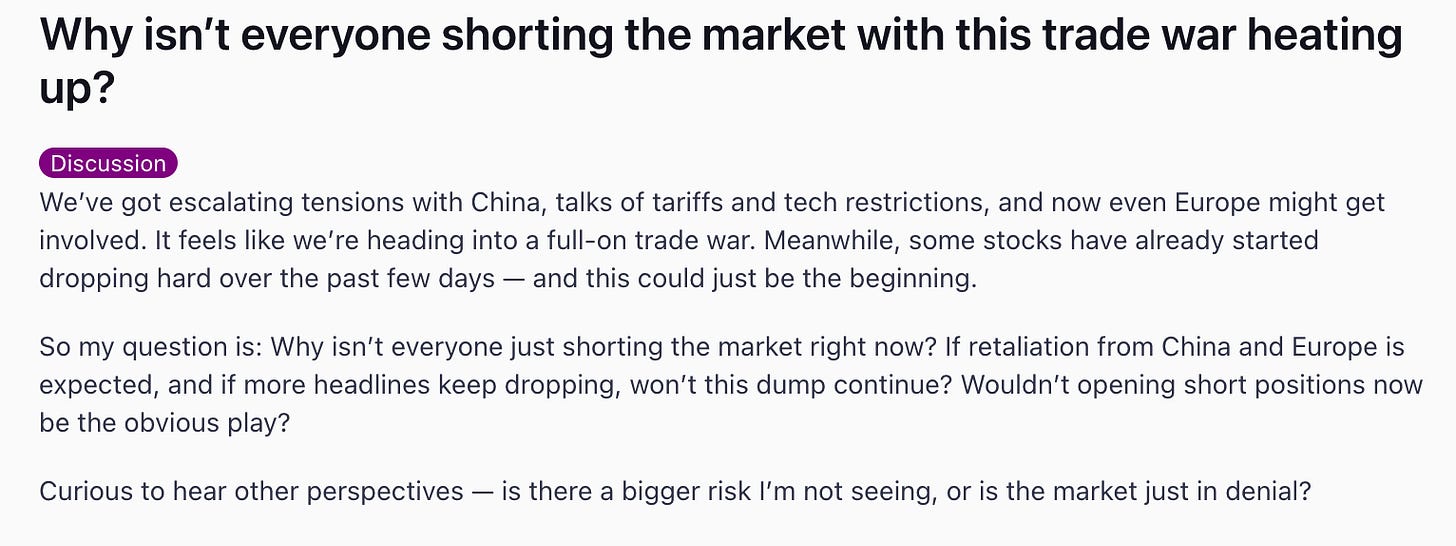Investor Questions: Why isn’t everyone shorting the market with this trade war heating up?
How should investors think about the trade war?
Below is a question posed on reddit, which many people seem to be asking.
It’s a fair question, and it’s natural to wonder why more people aren’t taking advantage of what seems like a clear downward trend due to the trade war. However, there are several reasons why investors might not be rushing to short the market.
1. Shorting is Risky by Nature
Shorting a stock (or the market) has unlimited downside. If the market rallies instead of drops, you can lose far more than your initial investment.
2. Markets Already Price in News
The market is forward-looking and may already be pricing in the trade war’s impact, meaning current stock prices reflect these risks.
3. Bear Market Rallies & Volatility
Even in downturns, markets experience sudden bounces (aka "bear market rallies"). These can wipe out short positions quickly. The market doesn’t move in a straight line, and short squeezes are brutal.
4. Intervention Risk
Governments and central banks often step in when the market drops too sharply — stimulus, dovish Fed talk, rate cuts, etc. Betting against the market means betting against the potential of policy intervention, which is a dangerous game.
5. Hedging & Diversification
Institutional investors may already be hedged through options or other instruments. Retail investors, meanwhile, often prefer moving to cash or rotating into defensive sectors rather than actively shorting. Not all sectors are equally affected and some may even benefit.
6. Long-term Mindset
Many investors focus on long-term growth, seeing the trade war as temporary, and prefer not to engage in short-term trading or triggering unnecessary tax gains.
Before making a decision on how to handle the trade war, you first need a trading plan, assess your risk tolerance, and consider using a risk assessment tool to see how your portfolio might be affected. Here are some scenarios where you might want to reduce exposure in the face of a trade war:
1. When Risk > Reward Based on Your Time Horizon
If you’re a long-term investor but anticipate needing capital in the next 6–12 months (for a house, tuition, etc.), reducing exposure makes sense. You don’t want to be forced to sell during a drawdown.
2. When Valuations Are Stretched & Macro Risks Are Mounting
Markets are trading at historically high valuations and there’s rising macro uncertainty with a trade war, recession, stagflation, or geopolitical shocks so it could be reasonable to reduce risk — trim winners, raise cash, rotate to defensive sectors.
3. When You Realize You’re Overexposed Emotionally
If every red day has you checking your portfolio obsessively or losing sleep, that’s your own personal signal. Portfolio management isn’t just math — it’s mindset. If you’re too exposed emotionally, it might be time to de-risk and come up with a new plan that doesn’t stress you out.
Remember, a successful investor stays disciplined, manages risk, thinks long-term, tunes out noise, and makes decisions based on data, not emotion. Stick to your strategy and avoid impulsive reactions to news.




